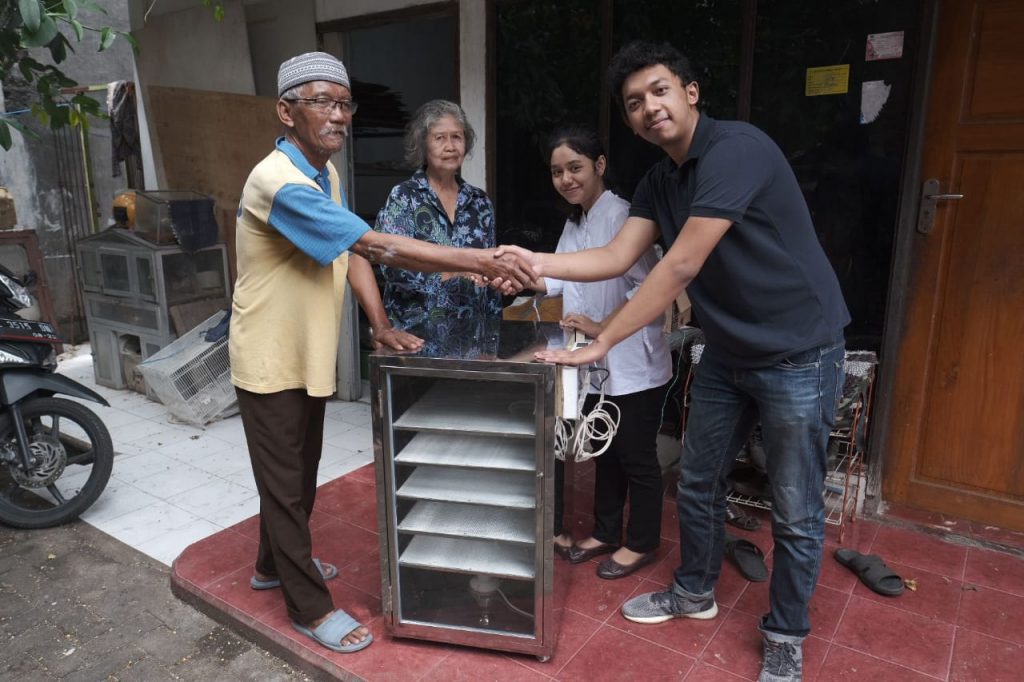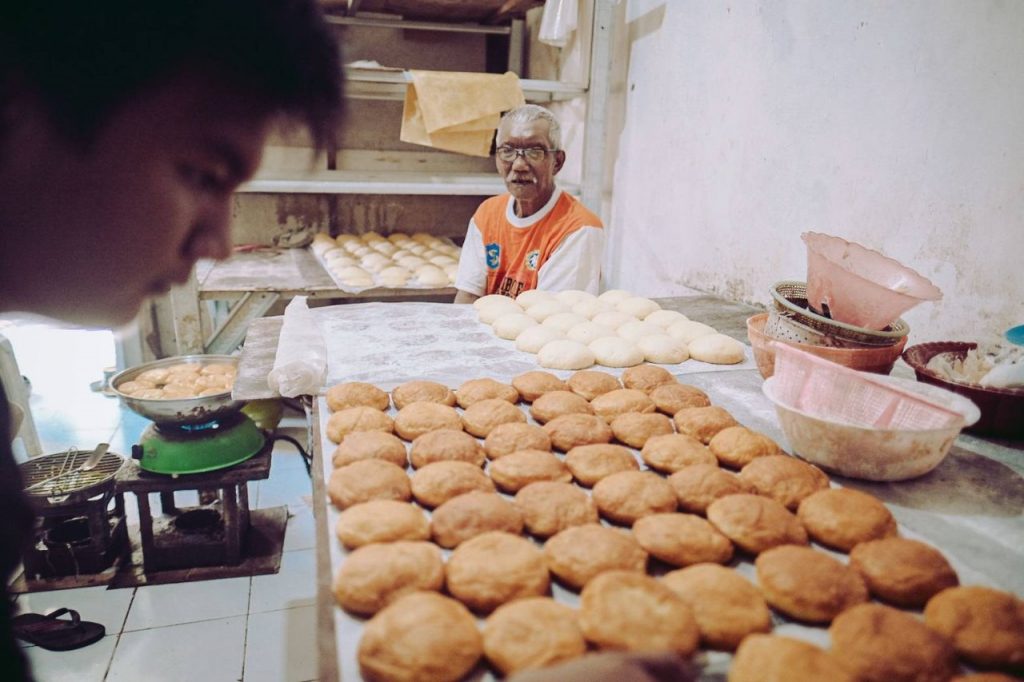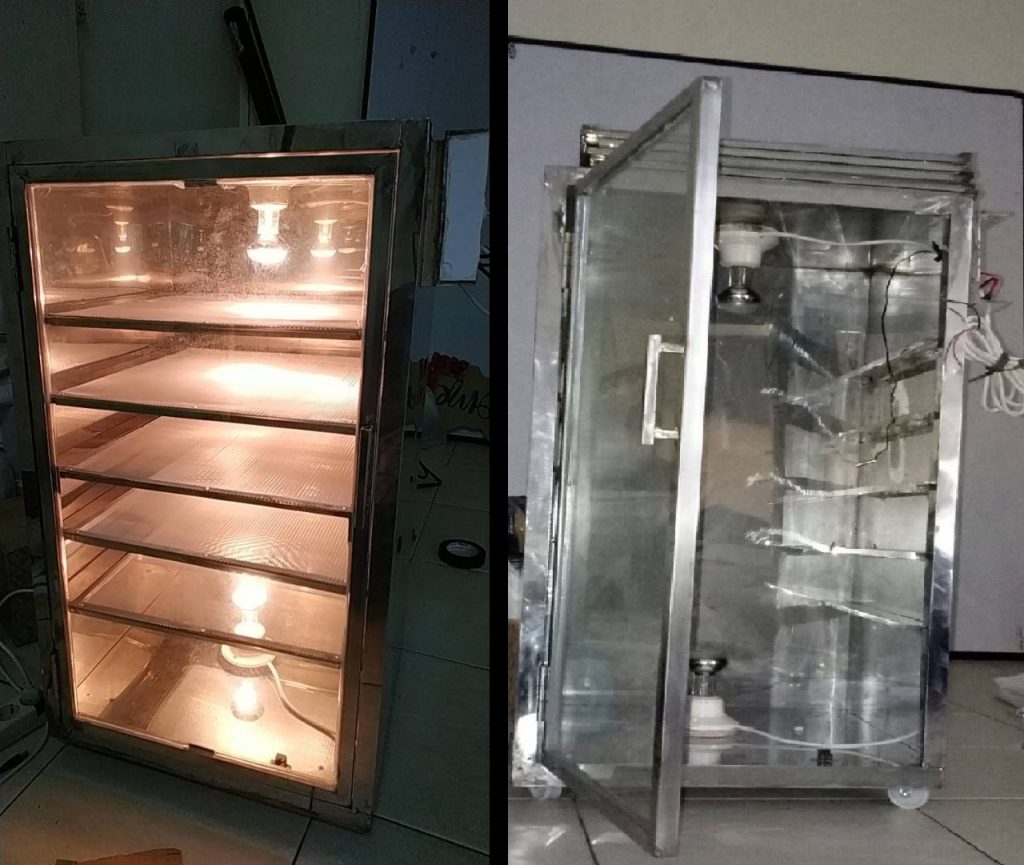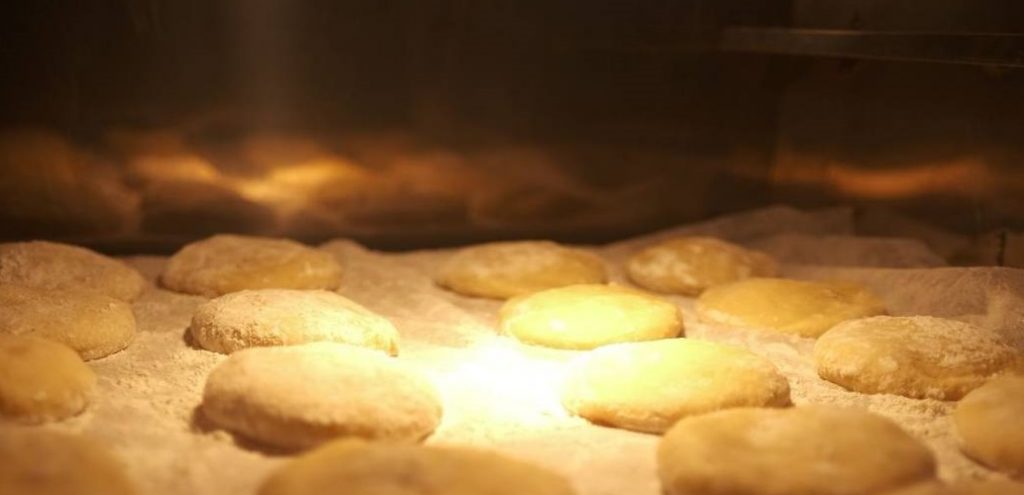ITS Students Help MSMEs Through Economical and Practical Donut Fermenters

Yoshida Aditama Karsono (most right) and Hanif Rachmawati (second from the right), members of the team, when delivering donations of Fermentor Donuts created by their team to MSME
ITS Campus,ITS News –
To help optimize the donut production process, a team of students, from the Chemical Engineering Department of the Institut Teknologi Sepuluh Nopember (ITS), designed an economical and practical donut fermenter. The team’s innovative work is targeted for Micro, Small, and Medium Enterprises (MSMEs) in the donut food industry.
It should be taken note that a good yeast fermentation process of bread can produce a donut mixture that has a soft texture and is loved by the audience. This donut fermenter made by Group 1 of Community Service-Based Field Study was in response to the problems that were experienced by Wid Donat Roti Kentang MSME in Kejawan Putih Tambak, Surabaya. In the process of donut production, they still use conventional processes that caused a less than the optimal condition of the dough development.
The fermentation process involves the microbial Saccharomyces cerevisiae which is known as bread yeast. The bread yeast can produce enzymes that break down sugar into alcohol and carbon dioxide (CO2) gas. This gas is formed in the fermentation process that causes the donut mixture to expand properly.

The donut dough that went through the fermentation process by the ITS Chemical Engineering students, and is ready to be fried
The leader of Group 1, Pandhu Dirga Pratama, explained that a good fermentation process is one that is isolated from oxygen and reaches its optimal point in accordance with the microbes used in the fermentation process. “We want to apply the theory of microbiology from the courses that we have in the department, in order to solve the problems of the MSME we visited,” he explained.
To be able to create optimal conditions for the yeast used in the process of developing donut dough, Pandhu and his group designed a fermenter shaped like a cupboard. The main function of this fermenter is as a dough developer. “The temperature and humidity are controlled according to the yeast used,” revealed this student from Bekasi.
Under the guidance of Prof. Dr. Arief Widjaja, M.Eng., and Dr. Eng. Raden Darmawan, S.T., M.T., this donut fermenter has a large enough capacity. The design consists of five pans, with a capacity of 20 donuts each.

The donut fermenter made by ITS Chemical Engineering students when the heating light is turned on (on the left) and when the fermenter is turned off (on the right)
Pandhu continued that there were two heating lamps with a capacity of 40 watts embedded above and below the proofer which worked to raise the temperature. This fermenter is also equipped with an alarm that sounds when the dough has expanded as desired.
This innovative tool works by heating donut dough at 35 to 37 degrees celsius. In this work, there is also a thermostat that maintains the temperature in the fermenter so that it does not exceed 37 degrees celsius. “If the temperature exceeds 37 degrees, the electricity connection to the lamp will be cut off automatically and the lamp will turn off,” he elaborated.

Donut fermentors are made by ITS Chemical Engineering students while processing the dough fermentation
To operate the fermenter, the user only needs to turn on the switch and the light. After that, the user needs to put the donut mixture into the baking pan on the fermenter, then close the fermenter glass. “If you have, just wait until the temperature reaches the desired optimal condition,” added Pandhu.
Within the one month of the process of making tools and mentoring for MSMEs, Pandhu and the group certainly also faced challenges. For them, the first difficulty was actually to make a schedule for MSME visitations because everyone has a different availability time.

The process of donut fermentation by ITS Chemical Engineering students
In order to get a good quality tool in Surabaya, it definitely takes extra time and process. “To use a tool, a lot of trials are needed so that the results will match expectations,” explained this student who was born in November.
Pandhu himself admitted that the tool still has a lot of room for development. Many related things that affect the fermentation process needs to be tested again. “We will continue to test and look for other variables so that the tool will be able to work better,” concluded Pandhu. (rys/ory/ITS Public Relations)
Related News
-
Facilitating Creativity of Students, ITS Information Systems Department Presents CCWS
ITS Department of Information Systems students conduct a discussion in one of the available spaces in the ITS Digital
January 14, 2020 20:01 -
ITS Explores Electrification Cooperation with PT Vale Indonesia
ITS Campus, ITS News — Following up on the Memorandum of Understanding (MoU) with PT Vale Indonesia, Institut Teknologi
January 14, 2020 20:01 -
ITS Reaches Top 7 BRIN Collaborators with 309 Scientific Publications
ITS Campus, ITS News — Institut Teknologi Sepuluh Nopember (ITS) continues demonstrating its commitment to strengthening collaboration in research
January 14, 2020 20:01 -
The Only One from Indonesia, ITS Student Becomes Erasmus+ Scholarship Awardee
ITS Campus, ITS News — Civitas academica of Institut Teknologi Sepuluh Nopember (ITS) has once again contributed to making
January 14, 2020 20:01
